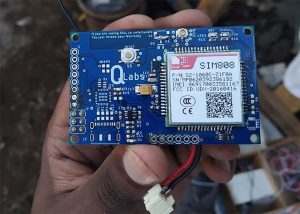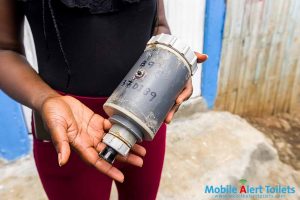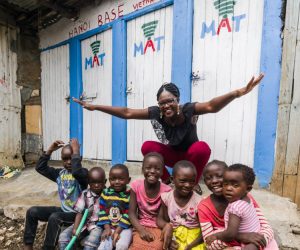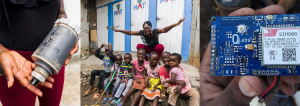In many urban slums of Kenya, the provision of latrines is inadequate, desludging unpredictable and human waste ends up in the environment. Joyce Klu decided to tackle the problem by retrofitting latrines with sensors. Her social business, incubated by Young Water Solutions and cewas, is currently focusing on improving the sanitation facilities in schools in the Korogocho slum in Nairobi, with the support of Toilets for All.
Joyce, what was your motivation behind creating MAT, how did it all start?
I grew up in Korogocho slum in Nairobi and experienced first-hand what it’s like to not have access to clean and safe sanitation. This inspired me to start looking for innovative and affordable solutions for the urban slums of Kenya. I studied water, environmental and chemical engineering and came up with the idea for Mobile Alert Toilets (MAT), which was founded in 2019.
Tell us a little bit more about the kind of challenges people face in the urban slums of Nairobi?
56 percent of urban residents in Kenya live in slums and most of this population, which is approximately 6.4 million people, do not have access to adequate sanitation. The population of Korogocho slum is 200’000 people and one pit latrine is shared by 30 people. Latrines overflow regularly due to late desludging and approximately 140 litres of fecal sludge is dumped into the Nairobi river every day. This is a huge challenge. My dream for every person living in the urban slums of Kenya is clean and safe sanitation and my dream for the Nairobi river is getting its aquatic life back.
What is your solution?


Our innovative idea is to install water level sensors into existing pit latrines to capture data on the fill levels. Thanks to these sensors, we can schedule emptying before the toilet overflows. Collection trucks receive automated text messages that tell them to collect waste from latrines that are at their capacity limit. Clients can also access the data and inform MAT in case of problems with the sensor. These sensors are waterproof and ultrasonic and are placed directly under the slab. The waste is safely removed and transported to recycle and treatment plants. We also have a community feature on our app which allows clients to interact with each other and make purchases for their sanitary needs in our online shop. Pit owners can also share ideas and alert MAT in case of problems.
What is your business model? How do you make sure people and communities can afford to install sensors and that the whole system and your business can stay operational?
We work with a blended model: we generate revenues by selling our sensors to landlords and also charge landlords a nominal monthly subscription fee for waste collection which they collect from tenants. We also generate some revenues from purchases in our online shop. We are currently exploring new avenues and opportunities, like the inclusion of carbon credits in our business model.
You have joined forces with three of our members, cewas, Toilets for All and Young Water Solutions, can you tell us more about the support you got from them?

Young Water Solutions (YWS) was the first organisation to support us, through their Young Water Fellowship Programme. MAT was only an idea at that stage. YWS provided us with start-up training, seed funding and coaching and thanks to their support, we were able to successfully pilot test our idea. Cewas worked in collaboration with YWS and was the leading entity in delivering the start-up training and later the acceleration programme. Toilets for All has been instrumental in funding MAT’s projects and has enabled us to accelerate from the pilot stage to several successful projects. We expect that our continued collaboration will eventually lead to scale up.
You focus on schools with Toilets for All, can you tell us more about these projects?

Since 2020, MAT has collaborated with Toilets for All on 12 school projects in Korogocho. Together, we have constructed and renovated school latrines, installed sensors and provided hand-washing stations to 2500 children. Thanks to our partnership with Toilets for All we were also able to send the fecal sludge to treatment plants, diverting it from the Nairobi river. We are about to start our biggest project with Toilets for All, yet. The idea is to equip latrines with biogas systems to produce cooking gas for school feeding programmes.
Could you share with us some of the biggest challenges you have encountered as a WASH entrepreneur and while building your WASH business?
One of our biggest struggles is to get support from the government for our projects. We have faced many difficulties when trying to import technology and equipment for our schools. We had to pay high import taxes for equipment that had been donated and was meant to help the most vulnerable. This was very dispiriting at times. We also struggle, like many other social WASH businesses, to access adequate funding to scale our operations. Last, but not least, we are still trying to figure out how to drive down the costs of our sensors while keeping the quality and robustness of our product intact.
What are your plans for the future?
We will continue to improve access to sanitation for the most vulnerable in Kenya. In the next year, we expect to work with at least 20 schools (5000 students) and expand into semi-urban areas. And in two-three years from now, we hope to have a market-ready sensor that can be sold at an affordable price to households and commercial entities. We also expect to partner with other international organisations that manufacture sanitation products such as Amalooloo, URIMAT and MSR Global Health and explore how to produce locally to reduce shipping costs of key products.

